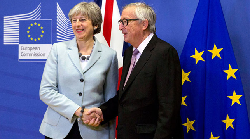December 2017 Research, Science and Knowledge
Read the articles selected in December 2017
“Open citations” movement targets big publishers
By Collen Flaherty
Source: Times Higher Education, 11 December

A movement of scholars funded by the Initiative for Open Citations, or 140C, advocates free access to publication citations, calling publishers to make available a public web of linked scholarly citation data, to enhance the discoverability of published content, what still requires expensive subscriptions.
Read more:
https://www.timeshighereducation.com/news/open-citations-movement-targets-big-publishers
Brexit agreement would allow EU scientists to stay in United Kingdom
By Erik Stokstad
Source: Science, 8 December

The Brexit deal with the EU recently announced gives certainty over the right of EU citizens to live or study in the UK, and to return within 5 years after leaving; it ensures the UK continuing participation in Horizon 2020, but it is unknown whether the UK will able to participate in successor programs for a fee.
Read more:
Educational Opportunity for All
Source: http://www.oecd.org
Education can address inequalities but, in fact, it reproduces social differences, in the multi-dimensional background every student brings into the school. Public policies are effective only if they join forces with teachers and local communities, in a long-term project more durable than political administrations.
See attached
Salaires: comment se fabriquent les inégalités hommes-femmes
By Anne Boring
Source: Le Monde, 2 December
A study by the French government which analyzes data on the gender wage disparities confirms the tendency of female students to choose curricula orientated towards the less remunerative professions, and the importance of the role played by universities and secondary schools in building women’ future career.
Why China wants “Western-style”liberal arts education
By Yojana Sharma
Source: University World News, 8 December
China’s openness to Western liberal arts in its education system with the inauguration of new experimental degrees shows to understand the need to acquire soft skills which can help humans to compete with machines and train thinkers, not only specialists.
Read more:
http://www.universityworldnews.com/article.php?story=20171202052059445
EUA’s Learning and Teaching Initiative. Report from the thematic peer groups
Source: http://www.eua.be,
This report originates from a discussion among peer groups from 31 universities from 17 countries on the strategies to follow at an institutional and political level to develop curricula suited to enhancing students’ research skills, considering how quality research and excellence in teaching are intertwined.
Blockchain in education
By Alexander Grech & Anthony F. Camilleri
Source: European Commission
This study investigates the benefits and risks in the application of blockchain technology in formal and not formal education, with its potential for digital accreditation of personal and academic learning by institutions and employers and the management of intellectual property.
Who really bears the cost of education? How the burden of education expenditure shifts from the public to the private
Source: http://www.oecd.org, 4 December
Across Oecd countries, governments are struggling to balance the share of public and private expenditure for education. Generally, the proportion of public transfer as a contribution to private spending tends to decrease as the share of private costs increases, what makes a difference in the access to education.
Knowledge exchange framework to band universities by performance
Source: Times Higher Education, 1 December

The knowledge exchange framework, announced by the British government will be a tool for measuring universities’ performances, with which the institutions will be grouped into clusters for comparison, making more transparent the underperformances for the best allocation of public resources.
Apprendre à gérer le stress des examens
By Séverin Graveleau
Source: Le Monde, 29 November

After the improving stress and anxiety observed among students, in particular of female gender in the imminence of exams, several universities in France organize courses that teach through relaxation techniques to overcome the commonplace that suffering is due before a test.
EUA’s Learning and Teaching Initiative
Source: http://www.eua.be
Eua is committed to increasing attention at a European level to learning and teaching in higher education, showing how research can be boosted and influenced by teaching and by students in an inquiry and research-based learning, shifting from a transmission of knowledge towards a shared enterprise in knowledge production.
EU to prioritise deeper HE cooperation and mobility
by Brendan O’Malley
Source: http://www.universityworldnews, 24 November
At an informal summit at Gothenburg, European heads of State and government have supported the European Commission’s proposals to promote higher education mobility and exchange through a European Student Card and new curricula in the sight of the European Education Area.
Read more:
http://www.universityworldnews.com/article.php?story=20171124074223184
OECD Science, Technology and Industry Scoreboard 2017
Source: http://www.oecd.org/
Across OECD countries the gap in the use of internet and connected devices is narrowing, while the digital transformation is affecting science, innovation, the way we think. Economies based on ICT technologies are more advanced and require from workers not only cognitive but also non-cognitive and social skills.
Education and Training Monitor 2017
Source: European Commission
This report by the EC analyzes comparatively the state of education in Europe in the perspective of the EU 2020 education targets, which aim to fight inequalities in education and in the achievements in reading, maths, and science due to socioeconomic background, the migrant condition and gender.
UK maths and language studies “could lose a third” of academics after Brexit
by Josh Gabbatiss
Source: The Independent, 14 November
40.000 academics in British universities are from non-UK EU countries. Brexit’s changes of rules in hiring and retaining foreign top talent will surround of uncertainty the high standing of UK institutions in education and research.
Info
- Pubblicato il : 15/01/2018 Modificato il : 04/04/2019
Allegati
- Apprendre à gérer le stress des examens pdf
- UK knowledge exchange framework pdf
- The cost of education pdf
- Blockchain in education pdf
- Eua's report from the thematic peer groups pdf
- Eua's learning and teaching initiative pdf
- After Brexit pdf
- Education and Training Monitor 2017 pdf
- Oecd science, technology and industry scoreboard 2017 pdf
- Comment se fabriquent les inégalités pdf

